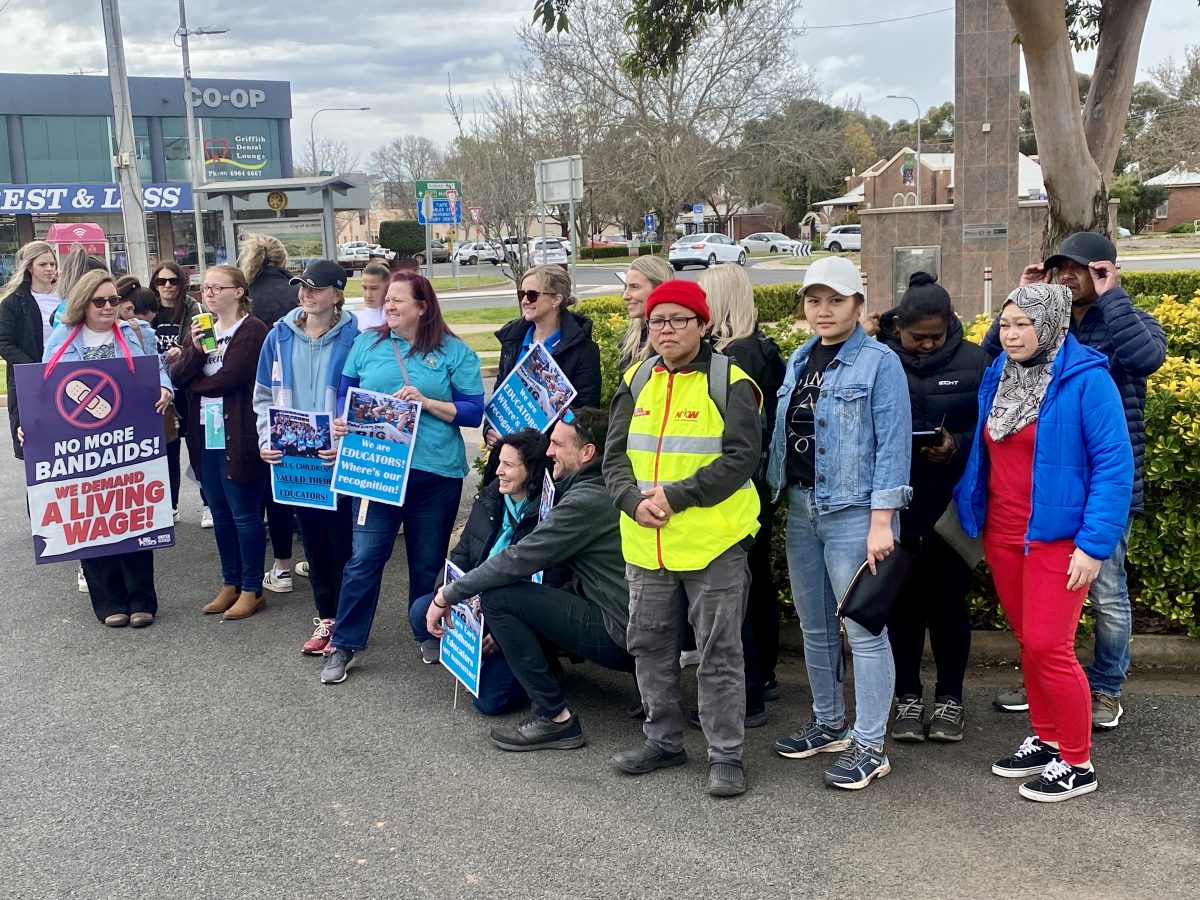
Suellen Roberts and Christian Callinan of Yenda Preschool at the Griffith protest. Photo: Oliver Jacques.
Childcare centres in Griffith shut their doors on Wednesday 7 September, as educators joined a nationwide protest for better pay and conditions.
Early childhood educators and general public supporters gathered outside the Griffith Visitors Centre at 2 pm and then marched and chanted along Banna Avenue before congregating at Memorial Park.
“Yes, we know cupcakes are yum, you can save them for your mum, educators need a change, real reform and a living wage,” was one rhyme sung by protesters.
Yenda Preschool director Christian Callinan says poor pay and conditions in the sector have led to chronic staff shortages.
“The entry-level wage is just $24 an hour, you can earn more at Bunnings,” he said.
“We just can’t get enough staff, when someone is sick we can’t find anyone to cover for them.”
Pay isn’t the only reason for the industrial action, Mr Callinan said.
“Workloads have doubled … there is a lot more paperwork and we are not being compensated for it,” he said.
Mr Cullinan thanked Griffith parents for supporting their industrial action. Griffith parents were advised of the shutdown last week and asked to make alternative arrangements for their children.
His colleague Suellen Roberts, who has worked in childcare for 28 years, says things have never been worse.
“We educate kids just as much as schools, but don’t get the recognition for it … the workload is enormous, during Covid it increased so much … we had to do home learning packs, but again we weren’t recognised,” she said.
“The subsidy parents are paid does not cover our costs.”

Griffith early education protesters gathered outside the Visit Griffith centre. Photo: Oliver Jacques.
Yenda Preschool education leader Simone Bardney says she can’t understand why a sector so important is so undervalued.
“The first thousand days of a child’s life are the most important,” she said.
The Griffith early educators were joined by more than 1000 of their colleagues across Australia in what the United Workers Union called a shutdown, rather than a strike.
“Today’s nationwide action shows United Workers Union members are committed to fighting for reform,” Helen Gibbons, director early education, United Workers Union said. “After nearly a decade of inaction from the previous government, the early education sector is in crisis. There are thousands of staff vacancies across the country and centres are turning away children because they don’t have enough staff.”
According to the Union, 98 per cent of educators say that staffing shortages are impacting the quality of care and education children receive. A further 99 per cent say that workload and staffing issues are making educators feel burnt out and undervalued.
“This all means that taxpayers are not getting what we pay for,” Ms Gibbons said. “Many children not getting the best possible early learning environment and parents are often not able to find appropriate care.
“Educators have had enough.
“The new Federal Government must urgently take concrete steps to address the workforce crisis in early education and reform the sector.”
The Federal Government has promised to introduce industrial relations reforms to allow workers to negotiate their pay and conditions with multiple employers and says it will ask the Productivity Commission to review the sector.









